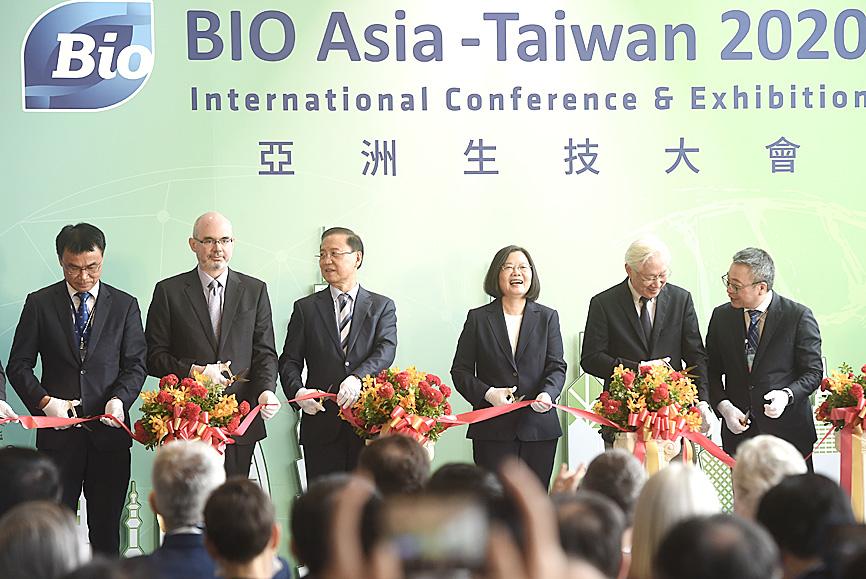During the opening ceremony of the BIO Asia-Taiwan Exhibition yesterday in Taipei, President Tsai Ing-wen (蔡英文) expressed the hope that advancements in Taiwan’s biotechnology industry would usher in major business opportunities from abroad, allowing the sector to reach NT$1 trillion (US$339.50 billion) in annual production.
Despite COVID-19, the annual biotech trade show attracted pharmaceutical and medical device companies from more than 500 nations, including the US, the UK, Australia, Switzerland and Malaysia.
The five-day exhibition is the first in-person international biotechnology trade show in Asia since the outbreak of COVID-19.

Photo: Chien Jung-fong, Taipei Times
Speaking at the opening ceremony, Tsai said that biotechnology is a crucial part of the “five plus two” innovative industries plan that she introduced during her first term, adding that she hopes the exhibition would be a platform for the nation to demonstrate innovativeness and accelerate the development of its biotech sector.
The nation would deregulate relevant laws to expedite the growth of the sector, she said.
The “five plus two” innovative industries plan refers to an initiative to develop an Asian equivalent of the US’ Silicon Valley, including biotech, green energy, industry 4.0, robotics, defense and aviation, as well as innovative agriculture and a circular economy.
Taiwan’s biomedical industry grew by 8.7 percent in annual revenue last year, a record high over the past few years, with the amount of capital invested reaching NT$55.1 billion, Tsai said, adding that digital medicine and precision medicine, two sectors that have shown great potential in recent years, are expected to grow significantly.
Cell therapy, regenerative medicine and genetic testing combined with big data analysis are also areas that have progressed a lot, while innovative medical devices, including nanomedical technology, are expected to receive more attention, she said.
New medicine development has also had breakthroughs, Tsai said, citing a licensing agreement signed in April by Taiwan’s Oneness Biotech Co Ltd and the Denmark-based Leo Pharma, a global leader in medical dermatology.
The agreement was signed to facilitate the development and introduction to the market of FB825, a drug candidate for novel atopic dermatitis and asthma, with an upfront payment to Oneness totaling US$530 million, the highest a Taiwanese company has ever received in such a deal.
Meanwhile, the National Biotechnology Research Park in collaboration with several multi-national pharmaceutical companies, accelerators and venture capital firms yesterday opened an accelerator hub for biomedical start-ups.
Speaking at the inauguration ceremony of the hub, former vice president Chen Chien-jen (陳建仁) said that the new facilities provide one-stop services to cultivate biomedical start-ups and has the potential to become the biggest accelerator hub in the field of biomedicine in the Asia-Pacific region.
The occupancy rate of biomedical companies at the park is 60 percent and the number is expected to reach 80 percent by the end of the year, Chen said, adding that growth at such a rate would be “beyond my imagination.”
Additional reporting by Chien Hui-ju

Taiwan is stepping up plans to create self-sufficient supply chains for combat drones and increase foreign orders from the US to counter China’s numerical superiority, a defense official said on Saturday. Commenting on condition of anonymity, the official said the nation’s armed forces are in agreement with US Admiral Samuel Paparo’s assessment that Taiwan’s military must be prepared to turn the nation’s waters into a “hellscape” for the Chinese People’s Liberation Army (PLA). Paparo, the commander of the US Indo-Pacific Command, reiterated the concept during a Congressional hearing in Washington on Wednesday. He first coined the term in a security conference last

Prosecutors today declined to say who was questioned regarding alleged forgery on petitions to recall Democratic Progressive Party (DPP) legislators, after Chinese-language media earlier reported that members of the Chinese Nationalist Party (KMT) Youth League were brought in for questioning. The Ministry of Justice Investigation Bureau confirmed that two people had been questioned, but did not disclose any further information about the ongoing investigation. KMT Youth League members Lee Hsiao-liang (李孝亮) and Liu Szu-yin (劉思吟) — who are leading the effort to recall DPP caucus chief executive Rosalia Wu (吳思瑤) and Legislator Wu Pei-yi (吳沛憶) — both posted on Facebook saying: “I

The Ministry of Economic Affairs has fined Taobao NT$1.2 million (US$36,912) for advertisements that exceed its approved business scope, requiring the Chinese e-commerce platform to make corrections in the first half of this year or its license may be revoked. Lawmakers have called for stricter enforcement of Chinese e-commerce platforms and measures to prevent China from laundering its goods through Taiwan in response to US President Donald Trump’s heavy tariffs on China. The Legislative Yuan’s Finance Committee met today to discuss policies to prevent China from dumping goods in Taiwan, inviting government agencies to report. Democratic Progressive Party Legislator Kuo Kuo-wen (郭國文) said

The Ministry of Economic Affairs has fined Taobao NT$1.2 million (US$36,900) for advertisements that exceeded its approved business scope and ordered the Chinese e-commerce platform to make corrections in the first half of this year or its license would be revoked. Lawmakers have called for stricter supervision of Chinese e-commerce platforms and more stringent measures to prevent China from laundering its goods through Taiwan as US President Donald Trump’s administration cracks down on origin laundering. The legislature’s Finance Committee yesterday met to discuss policies to prevent China from dumping goods in Taiwan, inviting government agencies to report on the matter. Democratic Progressive Party